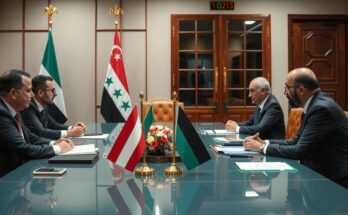The visit of El Salvador’s President Nayib Bukele to Argentina aimed to strengthen bilateral relations with President Javier Milei, focusing on key areas such as security, energy, and economy. The leaders signed a joint declaration covering various collaborative aspects including culture and air transport, while expressing shared views on governance and human rights criticisms.
The visit of El Salvador’s President Nayib Bukele to Argentina has concluded, marking a significant opportunity to enhance bilateral relations with President Javier Milei. The two leaders focused on cooperation in crucial areas including security, energy, and the economy. During Bukele’s inaugural visit, he was warmly received by Milei at the Casa Rosada, where they engaged in discussions that culminated in the signing of a joint declaration. This joint statement included agreements on cultural initiatives, air transport, nuclear energy, and sports. Following their bilateral meeting, Bukele conferred with Foreign Minister Diana Mondino to inaugurate a high-level business forum attended by representatives from various sectors, including technology and manufacturing. The discussions emphasized Argentina’s strategic investment opportunities, and the announcement of a trade mission to El Salvador in the automotive sector, planned for late 2024, was made. Both presidents share an ‘anti-caste’ ideology, openly criticizing human rights organizations for what they perceive as an inaccurate portrayal of their governmental motives. This mutual sentiment was echoed during the recent UN General Assembly, where both leaders dismissed UN initiatives, labeling them as influenced by a socialist agenda. Their partnership also extends to security policies, as Milei has expressed admiration for Bukele’s stringent approach to gang violence, which includes the controversial construction of a mega prison designed for high-risk offenders. The Argentine government, embracing a stricter stance against criminal activity, has established communication with Salvadoran officials, as evidenced by El Salvador’s Minister of Security, Gustavo Villatoro’s presence in Buenos Aires. Minister Patricia Bullrich reaffirmed Argentina’s commitment to combating drug trafficking, drawing inspiration from the ‘Bukele model’ of security enforcement. During the visit, Bukele was honored with a state ceremony—an indication of the importance Argentina places on the burgeoning partnership. Additionally, discussions extended into cryptocurrency, particularly regarding Bitcoin, which has been adopted as legal tender in El Salvador. Bukele exchanged views with Argentina’s Vice President and Senate President Victoria Villaruel regarding the formation of a national commission for digital currencies. In a statement about the dramatic reduction of crime rates in El Salvador, Bukele remarked, “The issue of security is, of all the things we have done, the one that is best known internationally… We started out being literally the most dangerous country in the world…”. The trip culminated in the signing of key agreements aimed at fostering cooperation in culture, transportation, and nuclear energy training, alongside several others that indicate a growing partnership between the two nations.
The significance of President Nayib Bukele’s visit to Argentina lies in the strengthening of diplomatic relations and cooperation on pivotal issues. The collaborative efforts focus primarily on enhancing security measures, economic trade, and energy resource management, particularly within the framework of nuclear energy. Both Bukele and Milei’s governing philosophies reflect a focus on stringent measures against crime and a willingness to challenge international standards related to human rights, indicating a strategic alignment in their policies.
The conclusion of President Bukele’s visit to Argentina underscores a pivotal moment in Latin American international relations, highlighting a shared vision between two leaders who emphasize strict governance in security and economic collaboration. The agreements reached during this visit signify a commitment to fostering deep-rooted ties and working collaboratively on issues of mutual interest, while also reflecting a common ideological stance against criticism from international observers.
Original Source: www.agenzianova.com




